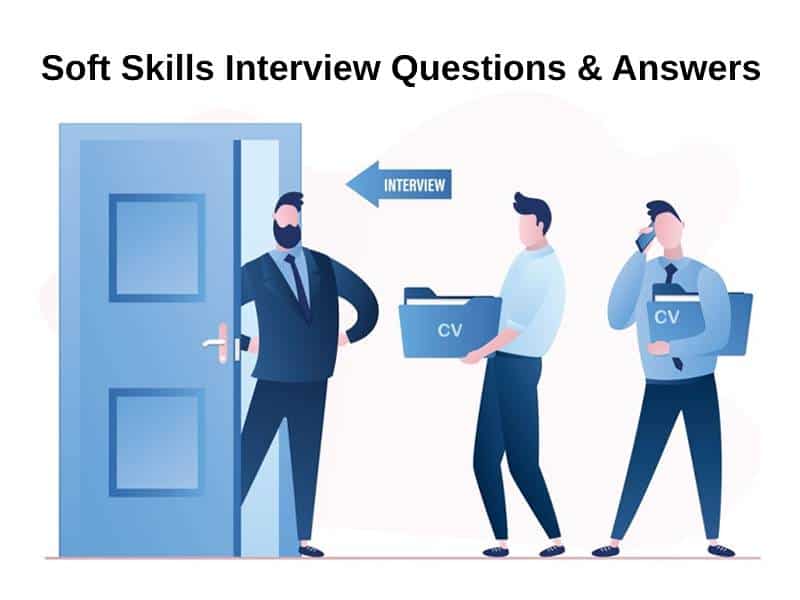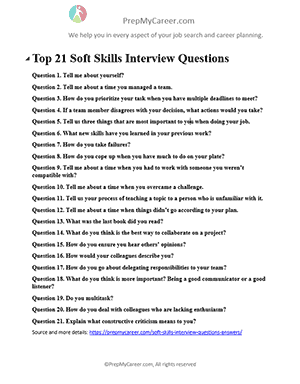Soft skills are non-technical skills that display productive personality traits and behavior. These skills allow people to communicate effectively in the workplace. They include how you interact with your superiors and subordinates, organize your work, work in a team, relate to others, solve problems, arrive at a decision, what kind of a leader you make, etc.
Examples of Soft skills are:
- Communication Skills
- Time Management Skills
- Networking Skills
- Creative Thinking Skills
- Conflict Resolution Skills
- Teamwork
- Problem-solving Skills
- Self-Motivation
- Flexibility
- Leadership Skills
- Decision Making Skills
Employers hire employees who possess a combination of both hard and soft skills. Employers look for candidates with soft skills because they are transferable skills and these skills make an employee adaptive to the dynamic environment.

Importance of Soft Skills
- They enable you to engage in meaningful interactions.
- They enhance your employability and help you achieve your dream job.
- They influence how well you can work with others.
- By developing soft skills, you can run a business, work on projects more smoothly and deliver results.
- They help in career progression and promotion.
- The future workplace will rely on soft skills.
- The modern workplace is interpersonal and hence, soft skills are a necessity.
- They ensure a productive, collaborative, and healthy work environment.
- They are in high demand by the hiring managers.
- Soft skills help in honing your abilities to resolve conflicts and provide excellent customer service.
How the Employers Can Frame the Questions?
Employers use STAR METHOD to ask questions that can help to assess a candidate’s soft skills. The STAR Method stands for Situation, Task, Action, and Result. This method is a structured interview technique that offers us a format of responding to the tricky behavioral-based questions asked in an interview in which we discuss a specific situation that could be a real-life example, a task and the action you took to resolve that situation and the after results that you accomplished through your efforts.
To answer questions like this, preparing for a STAR method interview can be extremely beneficial as you will get an idea of how you can craft your answer and impact the employer. So, you can use STAR behavioral response technique to outline the situation, your response to that situation, and the results and outcomes of that situation.
Lack of soft skills limits your potential and can prove to be the downfall of a business or a job. But you need not worry because they can be developed over time through various courses, training, and practices. You just need to recognize and acknowledge the areas that you need to improve.
Top 21 Soft Skills Interview Questions
Question 1. Tell me about yourself?
Answer: The employers ask this question as to the way how a candidate answers this question tells a lot about the candidate’s personality and traits. The employers can judge how you communicate about yourself and also see what skills and attributes you mention to describe yourself. This way an employer can evaluate an employee and test his soft skills.
Question 2. Tell me about a time you managed a team.
Answer: “I was the project head of my team and we were working on creating designs for our upcoming product. I am more of a democrat leader, so, I took suggestions from all my team members and we all came to an agreement and followed a design. Our project was a great success.”
Question 3. How do you prioritize your task when you have multiple deadlines to meet?
Answer: “I am best at organizing the task as I practice journaling daily and it helps me set my priorities. I divide my tasks from most important to least important and do them in that order.”
Question 4. If a team member disagrees with your decision, what actions would you take?
Answer: “I would try and listen to his point of view and take his suggestions on the same and try to negotiate with him so that we can reach some conclusion.”
Question 5. Tell us three things that are most important to you when doing your job.
Answer: “1. Customer Satisfaction, 2. My work performance, 3. Exceeding my employer’s expectations.”
Question 6. What new skills have you learned in your previous work?
Answer: “In my previous job, I developed excellent communication skills as my work was mostly telephonic.”
Question 7. How do you take failures?
Answers: “I don’t fear failures or get demotivated by them. I am a self-motivated person and failures could only teach me to do better in my work life. I try to study my failures and learn from them and rectify the mistakes that I made.”
Question 8. How do you cope up when you have much to do on your plate?
Answers: “In my previous role as a store manager, I use to juggle multiple tasks as I had multiple responsibilities. That turned me into a multi-tasker. Yes, it is stressful sometimes. But it increased my productivity and helped evaluate my priorities.”
Question 9. Tell me about a time when you had to work with someone you weren’t compatible with?
Answer: “I get along with people that I work with. But even if that was the case that would never affect my work life as my goals are clear and I don’t hold onto unnecessary grudges and let it affect my work.”
Question 10. Tell me about a time when you overcame a challenge.
Answer: “I was working on a finance report and I was already behind the deadline as I had a lot on my plate. I received a mail that said that the report needs to be submitted within 2 days. That really was a challenge for me, I worked overtime, worked overnight, and was able to complete it till morning.”
Question 11. Tell us your process of teaching a topic to a person who is unfamiliar with it.
Answer: “I like educating people on topics they don’t know about without making them feel inferior. I spare no detail and creatively explain it to them with the help of visual representations and practical examples of the topic. This gives a better understanding.”
Question 12. Tell me about a time when things didn’t go according to your plan.
Answer: “I failed to turn in a contract that I thought I would and that was the time when things did not go according to my plan. I felt demotivated, but then it is not every time it is possible that things can as you thought it would.”
Question 13. What was the last book did you read?
Answer: “I am currently reading Psychology of Money by Morgan Housel, this book has different short stories that talk about different ways in which people think about money.”
Question 14. What do you think is the best way to collaborate on a project?
Answer: “The best way to collaborate is to have excellent communication and negotiation skills and the ability to convince the third party into what you have to offer.”
Question 15. How do you ensure you hear others’ opinions?
Answer: “I am an active listener and so, hearing other’s opinions is not a problem for me as everyone has the right to express their thoughts.”
Question 16. How would your colleagues describe you?
Answer: “Well, I think they would describe me as a supportive and always ready to take up challenges person as I always help them with their work when they ask me to do so.”
Question 17. How do you go about delegating responsibilities to your team?
Answer: “Being a team leader, I would know which candidate excels in which skill and job, so I will discuss the tasks with them and assign them the tasks they are most comfortable with based on their skills and talents and also their job position.”
Question 18. What do you think is more important? Being a good communicator or a good listener?
Answer: “In my opinion, both of these things go hand in hand. A good listener is always a better communicator. The art of listening is more important than communicating, as you can only communicate meaningful things when you listen and interpret them.”
Question 19. Do you multitask?
Answer: “No, I am not a good multitasker, I like to focus on one thing at a time.”
Question 20. How do you deal with colleagues who are lacking enthusiasm?
Answer: “I will try to boost their morale through organizing playful activities and creating a healthy work environment. I am a good motivator, so I will try to encourage them through my speech.”
Question 21. Explain what constructive criticism means to you?
Answer: “According to me, it is important as it helps in getting helpful feedback that can provide better suggestions on doing a task. It can help you gain recommendations on how to make positive improvements.”
Download the list of questions in .PDF format, to practice with them later, or to use them on your interview template (if you want to crack Interview):
Conclusion
So, these were the top 21 questions based on soft skills. Now we know the importance these soft skills hold in our work life. Review all of the above-mentioned sample questions and answers to improve the quality of your responses on soft skills as can help you convey to a hiring manager that you are the perfect fit for the job position. This is your time to shine, show the employer that you are a candidate who can adapt to multiple situations by showcasing your soft skills, and ace that interview. Comment what you liked about this article and I hope you enjoyed reading it. Don’t forget to share this with your friends. We wish you luck for your next interview, till then keep working on your soft skills.
Thank you for reading.
References
http://mjs.um.edu.my/index.php/MOJEM/article/view/6088
Sandeep Bhandari is the founder of PrepMyCareer.com website.
I am a full-time professional blogger, a digital marketer, and a trainer. I love anything related to the Web, and I try to learn new technologies every day.
All the team management, content creation, and monetization tasks are handled by me. Together with the team at PrepMyCareer, the aim is to provide useful and engaging content to our readers.
